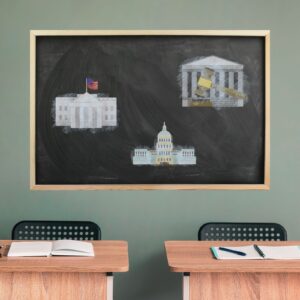Clintonian Policy in a Changing World:
An assessment of the impact of former President Bill Clinton’s foreign policy reveals a mixed legacy. While many Clinton loyalists praise him for being a true globalization president who embraced the challenge of steering the post-Cold War America into a model of economic prosperity and democratic influence, countless critics bemoan Clinton’s “tactical ad hocery” and lack of foreign policy experience in this critical juncture of American history. Political commentator and former Presidential advisor Pat Buchanan even went so far as to say: “Bill Clinton’s foreign policy experience stems mainly from having breakfast at the International House of Pancakes.”[1]
While Buchanan’s comments are humorous, Clinton opened himself up to a myriad of criticisms on his foreign policy and non-domestic principles that scholar Stephen Walt observes as Clinton being—
“Too eager to accommodate a rising China, too blind to Russia’s corruption and cronyism, and too slow to use force against states like Yugoslavia or Iraq. On the left, liberals bemoaned Clinton’s failure to prevent the genocide in Rwanda, his tardy response to the bloodletting in the Balkans, and his abandonment of his early pledge to build a multilateral world order grounded in stronger international institutions. Even pragmatic centrists [found] him wanting, deriding his foreign policy as “social work” that [was] too easily swayed by ethnic lobbies, public opinion polls, and media buzz.”[2]
While the concerns noted above are not entirely unfounded, Clinton does not deserve the chorus of criticism he has received regarding his seemingly apathetic views on foreign policy.
When Clinton assumed the presidency on January 20, 1993, his agenda included creating millions of new jobs, reducing the deficit, and drafting new crime bills to protect the American people. Clinton’s initiatives attempted not only to steer the U.S. economy out of a recession wave that had followed from an unprecedented stock collapse coinciding with bank failures and spiking oil prices–the President’s agenda also sought to address broader increases in domestic poverty and crime rates. With so many problems close to home, it is no wonder that Clinton’s initial focus was on domestic issues—and indeed, these initiatives helped to boost Clinton’s national approval ratings to stratospheric levels at the beginning of his first term. In fact, he articulated no intention to change the nation’s extant foreign policy unless he saw opportunities, in doing so, to bolster the American economy. In his inaugural address, he chose to fire up the American public by promising job growth and a reduction in the national debt by “offer[ing] more opportunity to all and demand[ing] more responsibility from [politicians and corporate leaders alike].”[3]
At home, Americans were seeking both domestic revitalization and a peace dividend following the end of the Cold War. Despite his aim to focus on the domestic economy, Clinton could not ignore the outside world. Clinton’s focus on domestic issues gradually shifted to a focus on international issues when he had to acknowledge that the global population was affected by “a world economy, world environment, world AIDS crisis, [and] world arms race”. As the first post-Cold War era President, Bill Clinton needed to break from his predecessor and formulate a comprehensive foreign policy plan that would account for a collapsed Soviet Union, a rapidly emerging China, and a recession-fueled Europe. This monumental task had to be taken up to address America’s lack of a long-term foreign policy that rivaled the scale of the containment of the Cold War. The Clinton administration began to realize that there was no longer a clear distinction between domestic policy and foreign affairs. Undaunted by the responsibilities of America’s self-perceived obligations to humanity, President Clinton promised that U.S. foreign policy would place significantly more focus on his “doctrine of enlargement,” with the goal of expanding democracy and humane values. In his inaugural address, he pledged U.S. action whenever “the will and conscience of the international community is defied.”[4] The President of the United States is required to define America’s national interest according to the circumstances that exist during his time in office. While interventions might be inevitable, based on the scope of this pledge, Clinton suggested these actions would only be taken in order to defend national interests and other relevant securities.
In a 1999 speech given in San Francisco, Clinton announced his “doctrine of enlargement” in order to proclaim his commitment to strengthening the world community and increasing the number of free market democracies around the world. In the speech, Clinton emphasized “the consequences to our security of letting conflicts fester and spread. We cannot, indeed, we should not, do everything or be everywhere. But where our values are at stake, and where we can make a difference, we must be prepared to do so.”[5] Similarly, his inaugural address laid out a vision where America continued its multilateral peacekeeping efforts in a post-Cold War era, where “when our vital interests are challenged, or the will and conscience of the international community is defied, we will act with peaceful diplomacy whenever possible, and with force when necessary.”[6] Clinton explained his agenda before the UN General Assembly on September 27, 1993:
“During the Cold War, we sought to contain a threat to [the] survival of free institutions. Now we seek to enlarge the circle of nations that live under those free institutions. For the first time in history we have the chance to expand the reach of democracy and economic progress across the whole of Europe and to the far reaches of the world.”[7]
While Clinton’s public remarks highlighted the importance of free institutions after the Cold War, the four main goals that dominated Clinton’s foreign policy dealings had broad implications for the protection of civil liberties and peace across borders. First, the administration tried to open up trade relations to stimulate a more productive world economy, which directly influences the prosperity of the U.S. economy. Second, the administration tried to build a world order compatible with basic American values by encouraging the growth of democracy and by using military force against major human rights abuses and offenders. Third, it remained militarily engaged and active in Europe, Asia, and the Middle East, aiming to reduce the risk of major wars in these regions. And fourth, the administration wanted to reduce and, if possible, completely eradicate the threat of weapons of mass destruction, which would eliminate tensions over possible nuclear warfare.[8]
Of course, a large share of Clinton’s foreign policy was very Euro-centric. As a valuable trade and investment partner for the U.S., Europe acts as an important source of stability whenever a crisis occurs in another part of the world. As such, the United States was very involved in European affairs, especially in the Balkans where NATO forces fought to restore peace to Serbia. Clinton understood the importance for Europe to build its own common security and defense policy in close cooperation with NATO so that Europe could grow into a strong and resourceful ally.
Addressing a NATO summit meeting in Brussels on January 10, 1994, Mr. Clinton said,
“We have to recognize that this new (post-Cold War) security challenge requires a range of responses different from the ones of the past. That is why our administration has broken with previous American administrations in going beyond what others have done to support European efforts to advance their own security and interests.”[9]
The United States supported the commitment of the EU to a common foreign and security policy. Mr. Clinton explained that,
“Consistent with that goal, we have proposed making NATO assets available to Western European Union operations in which NATO itself is not involved. We believe a strong and more unified Europe makes for a more effective economic and political partner.”[10]
But of course, a strong and unified Europe means a resilient, cooperative and diplomatic Russia. In order to bring about a more consolidated European coalescence, America first had to help the former Soviet Union back on its feet in the devastating aftermath of the Cold War. To do so, the President lobbied successfully for the inclusion of Poland, Hungary, and the Czech Republic in NATO, and also supported the besieged leadership of Russian president Boris Yeltsin. In addition, Clinton approved of billions of dollars in loans to Russia from the International Monetary Fund, ultimately a risky and controversial investment. Clinton’s administration also deserves credit for an often-overlooked achievement not easily measured in monetary value or immediate influence: maintaining the security of the Russian nuclear arsenal. The Cold War had introduced the ever-present threat of nuclear warfare breaking out between the two most nuclear-prolific nations in the world. Thus, an agreement to begin deactivating dangerous nuclear weapons programs was easily one of the most significant actions of Clinton’s presidency. Working through the provisions of the Nunn-Lugar Act, which established a fund that facilitated the deactivation and disposal of nuclear arms, the administration provided extensive technical assistance and funding to the former Soviet states for the safeguarding of nuclear power plants and dismantling of nuclear weapons. The Nunn-Lugar Act also welcomed foreign nuclear scientists into the American community as a way of slowing down nuclear proliferation. By the end of the Clinton presidency, the likelihood of a nuclear exchange between the superpowers was almost nonexistent, which is astonishing considering the hostility and animosity that previously existed between the Soviet Union and the United States.
Mr. Clinton’s policies during his eight years in the White House added a new, post-Cold War dimension to America’s vision of its global role as a superpower whose might is based as much on economic, trade, financial, technological, and cultural strength as it is on traditional military power.
Some excellent examples of America’s ever-evolving role as an enforcer of world order came in the form of major international challenges highlighted by the aforementioned civil and ethnic conflicts in the Balkans. For two years, Clinton kept U.S. involvement in the conflict to a minimum, in an effort to assess the situation completely and to avoid sacrificing unnecessary American lives. But after two years, Clinton needed to take action to counteract the Serbian atrocities against Bosnian civilians. The administration pushed NATO to begin bombing Serbian strongholds in Bosnia in order to free the Bosnian civilians from the repression and discriminatory killings that pervaded their environment and their homes. Eventually, the use of force, in tandem with diplomatic efforts led by Assistant Secretary of State for European Affairs Richard Holbrooke, brought the three warring parties—Croats, Serbs and Bosnian Muslims—together at the bargaining table to hammer out a peace treaty. The result was the Dayton Peace Accords, which effectively ended fighting between the parties. In order to enforce the cease-fire put in place, Clinton lent support to a NATO deployment by sending an American peacekeeping force of about 20,000 soldiers. This military action was intended to stabilize the area so that democratic free elections could be held in the future. American and NATO troops enforced an uneasy settlement that stabilized war-torn Bosnia with no American casualties. Afterwards, Clinton joined with NATO to begin a massive bombing campaign against the Serbian government to end the blatant “ethnic cleansing” of hundreds of thousands of Albanians in the Kosovo region. The bombing, along with the help of Russian diplomacy, successfully drove the Serbian government out of Kosovo without a single American casualty. Clinton’s forceful stand in Bosnia and Kosovo and decisive leadership in the face of logistically complicated war scenarios enhanced his foreign policy resume and proved his mettle in foreign affairs.
With all of the successes that Clinton had in the foreign policy ring, however, it is also essential to point out the times when his policies led to notable failures. In Haiti, following Clinton’s failed attempt to oust Haitian strong man Raoul Cédras in 1993, former President Jimmy Carter stepped in to negotiate with the brutal military dictator for his removal from power. Cédras had overthrown the Caribbean nation’s democratically elected president, Jean-Bertrand Aristide, in a 1991 coup. Accompanied by retired General Colin Powell and Senator Sam Nunn, Carter communicated Clinton’s threat to invade unless the generals of the junta relinquished power. With American planes looming overhead and the threat of warfare imminent, the generals caved and agreed to leave. United States forces were sent in afterwards to make certain that the agreement was enforced, but they were eventually withdrawn. The democratic institutions of this impoverished nation have remained fragile and endangered ever since. Even though the Clinton administration succeeded in pushing the military leaders out of power and instituting an American-endorsed democratic government system, Clinton had to rely on a superstar team of politicians to vocalize his threat of military intervention to the Haitian generals. Not only did this setback expose America’s weak influence over smaller and underdeveloped nations, but also showed how delicate and brittle a democratic system can be without the right kind of leadership and without the economic and political might that the United States consistently falls back on. Ideally, every country would operate under an effective democratic system where repression and military rule no longer exist. But it is dangerous to instill a democratic system on a country that is not yet ready to stand on its own. The approach has to be gentle and supportive or else there’s a risk of all progress becoming undone.
More significant a failure was Clinton’s inability to prevent the genocide of Rwanda, which was a direct result of his failure to bring peace and stability to Somalia years before, where an attempt to combat famine and military warlords resulted in heavy American soldier casualties and almost no progress in the creation of a functioning government in the nation. In 1994, a killing spree of immense proportions broke out in the central African nation of Rwanda. More than 800,000 Tutsis and their allies were murdered in a government-sponsored genocide. With the failure in Somalia still very much in the minds of American policymakers, neither the United States nor the United Nations moved aggressively to stop the slaughter for fear of sacrificing troops for a seemingly lost cause. The outrage regarding the lack of response from the world’s top leaders was palpable. Both Clinton and the world community were criticized for not acting quickly and decisively to stop the violent deaths of Rwandans. Many critics pointed out that if America had had any direct interests in Rwanda, its response would have been very different.
In the end, views on William Jefferson Clinton’s record as a world leader have been sharply divided. Where supporters saw pragmatic leadership and bold innovation, critics saw improvised initiatives that left America adrift. The effects of some of Clinton’s policies are still evident today, especially with the recent disintegrating relationship between the U.S. and Russia over the removal of dictator Bashar al-Assad from power in Syria.
Despite these setbacks and impressions, though, Professor Louis W. Goodman, Dean of the School of International Service at American University, writing [at this time], anticipated that Clinton would leave behind “a very positive legacy [because] he started a huge new concept of America as a world leader by enlarging the scope of U.S. leadership. During his eight years in the White House, Mr. Clinton relied at least as much on diplomacy as on America’s economic, technological, and cultural muscle, to export our leadership across the world.”[11]
Mr. Clinton also helped set the foundation that led to the World Trade Organization’s becoming a group arguably as influential and important as the United Nations and brought the issue of trade agreements to the forefront of importance in foreign policy alongside of peace treaties. His ability to adapt to a volatile world cemented his legacy as the globalization president. And Clinton understood more profoundly and more clearly that many of his peers that “Everything from the strength of our economy, to the safety of our cities, to the health of our people depends on events not only within our border but half a world away.”[12] This incredible foresight lent Clinton the impressive ability to consolidate an understanding between his administration and the rest of the world—and this consolidation led to the U.S.’s enjoying more peace and economic well-being during Clinton’s presidency than at any other time in its history. In fact, the American people were so pleased with his accomplishments after his first term that he became the first Democratic president since Franklin Delano Roosevelt to win a second term.
It is also not surprising that Clinton was extremely popular even abroad. Under Clinton’s watch, the world was substantially wealthier than it had been eight years prior. There were fewer wars and fewer nations possessed nuclear weapons, though the persistently booming business of international arms sales remained a slight disappointment and a minor blip on Clinton’s record.[13] So what sort of world did Bill Clinton help shape?
A New York Times article summarized his legacy at the end of his presidency as follows:
“His White House years have been marked by prosperity, rancor, achievements, disappointments and something approaching a national psychodrama involving Mr. Clinton himself. Mr. Clinton presented himself as an agent for change. But with or without him, the 90’s were bound to be a decade when change rolled across the economy, international relations and the political culture with a grinding inexorability. Historians will surely record Mr. Clinton as the first president to be impeached since 1868 and as having presided over America’s longest economic expansion. That’s the easy sentence to write. But they may also come to see him as the shaper of some main themes of governance for the 21st century.”[14]
Clinton’s time in the White House could be described as an amalgamation of prosperity, public disenchantment, disappointment and excitement. Clinton had a number of personal indiscretions during office that overshadowed much of the positive influence he had on the world. But Clinton’s presidency should be remembered as one of the most successful in recent memory, not only for its enormous domestic accomplishments and foreign policy achievements, but also for creating a stronger nation at the beginning of a new century. Clinton helped usher in the age of global interdependence and assembled an impressive framework of policy initiatives to promote global peace and prosperity. However, Clinton’s delayed response in helping prevent genocide in Rwanda as well as the failed attempt to democratize Syria are two major setbacks in the Clinton administration, the effects of which are still felt in the U.S. today in the rise of the Islamic State in a fractured Syrian nation. Despite these complications, Clinton’s work in transitioning Bosnia from civil war to functioning democracy, as well as his work in fostering peace and safety around the world through the dismantling of Russia’s nuclear arms program paved the way for a world that now has the highest number of democracies and lowest number of autocracies ever recorded. The majority of the world is now governed by free democratic systems. It’s hard to argue against Clinton’s record of orchestrating the greatest expansion in world trade in history while simultaneously promoting peacemaking and principled constructive relationships with former adversaries.
References:
“An Appraisal; Bill Clinton’s Mixed Legacy.” The New York Times. The New York Times, 14 Jan. 2001. Web. 04 Dec. 2015. <http://www.nytimes.com/2001/01/14/opinion/an-appraisal-bill-clinton-s-mixed-legacy.html?pagewanted=all>.
“The Avalon Project: First Inaugural Address of William J. Clinton.” The Avalon Project: Documents in Law, History and Diplomacy. Yale Law School: Lillian Goldman Law Library, n.d. Web. 04 Dec. 2015. <http://avalon.law.yale.edu/20th_century/clinton1.asp>.
“Clinton’s Foreign Policy.” Foreign Policy 121 (2000): 18+. JSTOR. Web. 5 Dec. 2015. <http://www.jstor.org/stable/1149615>.
De Beer, Patrice. “Bill Clinton’s Legacy: Make Trade, Not War.” European Affairs 2.1 (2001): n. pag. The European Institute. McGraw-Hill. Web. 4 Dec. 2015. <http://www.europeaninstitute.org/20011202562/Winter-2001/bill-clintons-legacy-make-trade-not-war.html>.
Freidel, Frank, and Hugh Sidey. “William J. Clinton.” The White House. The White House Historical Association, n.d. Web. 03 Dec. 2015. <http://www.whitehouse.gov/about/presidents/williamjclinton>.
“The Legacy of the Clinton Administration.” PBS. PBS, n.d. Web. 03 Dec. 2015. <http://www.pbs.org/wgbh/americanexperience/features/general-article/clinton-legacy/>.
“New American Nation.” The Post–cold War Era. Encyclopedia of the New American Nation, n.d. Web. 05 Dec. 2015. <http://www.americanforeignrelations.com/O-W/Realism-and-Idealism-The-post-cold-war-era.html>.
Walt, Stephen M. “Two Cheers for Clinton’s Foreign Policy.” Foreign Affairs 79.2 (2000): 63-79. JSTOR. Web. 4 Dec. 2015. <http://www.jstor.org/stable/20049641>.
The White House. Office of the Press Secretary. President Clinton’s Speech on Foreign Policy, 26 February 1999. President Clinton’s Speech on Foreign Policy, 26 February 1999. N.p., n.d. Web. 06 Dec. 2015. <https://www.mtholyoke.edu/acad/intrel/clintfps.htm>.
“William J. Clinton: Inaugural Address.” William J. Clinton: Inaugural Address. N.p., n.d. Web. 06 Dec. 2015. <http://www.presidency.ucsb.edu/ws/?pid=46366>.
- http://buchanan.org/blog/1992-republican-national-convention-speech-148 ↑
- Ibid. ↑
- William J. Clinton: Inaugural Address ↑
- The Avalon Project ↑
- The White House ↑
- William J. Clinton: Inaugural Address ↑
- New American Nation ↑
- Walt 66, 67 ↑
- De Beer ↑
- Ibid. ↑
- De Beer ↑
- Clinton’s Foreign Policy 19 ↑
- Ibid 26 ↑
- An Appraisal ↑





